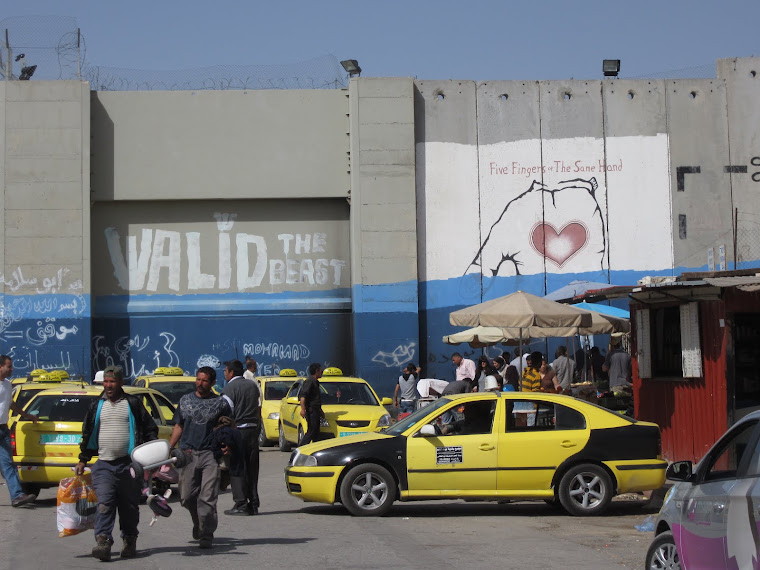By 3:50 AM the lane for laborers was completely full. It holds perhaps 1000 people. We give cards to 3 people at the end of the line in hopes of retrieving at least one at the end when they have exited. We fill in the time that we give the card, and then fill in the time when we receive the card. This tells us how long it took to get from the end of the line through the check-points. Today the time was one hour 40 minutes.
One of our team members remains in the exit lane at the first ID check station. From the line, men are allowed to move from the 15 x 15 room one at a time through a turnstile. One by one they pass through a continuation of the chain-link structure, covered, with an office with windows on all sides, where one soldier sits, manages crowd control by controlling the turnstile. Once through the turnstile each person comes to the window and has to show their ID before proceeding out of the building. From there these men, normally running, go across a parking lot and into the next area where there is a scanner. They must remove coats, take off shoes, and have everything scanned and go through a scanner much like at an airport. When they have passed that check they move on to the document check. I just have to show a passport. As Palestinians have no passport, they must show their work, or study. or emergency need card plus their fingerprint card. The fingerprint must match the card in order for them to pass through to the "Israeli" side, which is still in Palestinian territory according to the Oslo Agreement. Today an Israeli organization reported that this was a very bad day for people getting through--more than the normal were sent back.
The process is dehumanizing. At one point the men had crowded so many into the 15 x 15 room that I feared for their lives. One man had previously been crushed to death in this room. As the checkpoint does not open until after 4AM, many of the men have been waiting for up to an hour, perhaps more, and have been standing throughout that time. At 5AM the call to prayer occurs, but most of the men do not have enough room to pray. Many wait until they get through the checkpoints to pray, a few drop out of the line, some find some little bit of space, and they do their morning devotions.
One person at a time is allowed through the turnstile, although many crowd in so that often there are 2 to 3 people in one turnstile section. Sometimes they then get sent to the back of the line. Most times the Israeli guard just instructs them to approach the office window one by one. When there is a back-up at the metal detection/scanner area the turnstile closes until the area has been cleared. The turnstile might then be open for 10 minutes and then traffic will stop for 5-10 minutes. This morning the turnstile let in perhaps 100 of the 3300 who would eventually pass through, then stopped for 20 minutes until my teammate called the human right hot line. They then reopened.
I did see a sign of hope. One of the Israeli soldiers was actually somewhat friendly with the Palestinian men. He actually joked a bit with them. At one time he noticed a man dressed in Beduin clothing return to exit the area, meaning he had been refused entry. The Israeli soldier stopped him and asked what had happened. The man showed the soldier his papers and he looked them over and then placed a call to his superiors. The man was ultimately refused entrance, but the soldier was able to tell him why he had been refused. Other than the fact that the 19 year old Israeli soldiers controlled the lives of these 3300 men, women, and children for a few hours daily, I did see a slice of humanity.
At a going away party for the team leaving I met a woman from Israel who is part of the group that reported on the poor acceptance of Palestinians through the checkpoint today. I had spoken to her for quite a while and then was speaking to the young communist man I mentioned in an earlier post. He pointed to the woman and said to me, "This woman is Jewish, no?" I said yes, and he greeted her in Hebrew and a lenghty and very friendly conversation ensued during which time I witnessed two people, one Jewish, one Palestinian, become friends. They embraced as they left the party.
Today I was reminded by a Palestinian that peace will come when we all recognize the God in one another. With that note I will go to sleep.

No comments:
Post a Comment